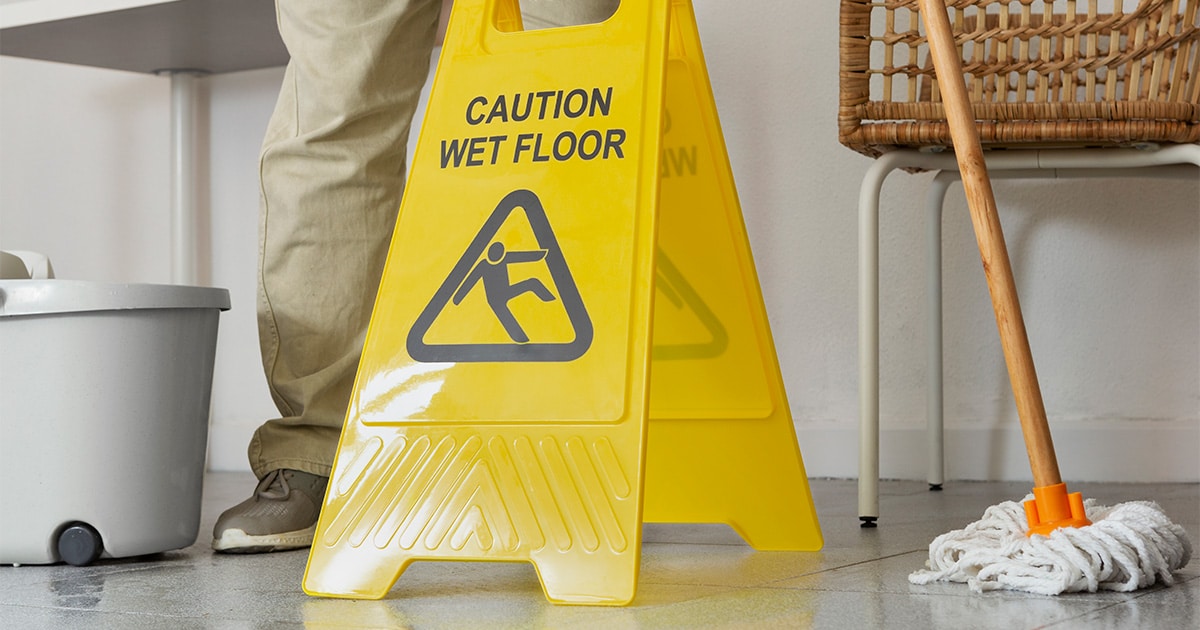Texas Premises Liability lawyers at Carter Law Group fight for the entitled compensation for the injured from the property owner’s negligence. Contact us today. Call (214) 390-4173.
Premises Liability Overview
What happens when you’re injured on someone else’s property?
Whether or not a property owner in Texas can be held liable for injuries sustained by visitors on the owner’s property depends on a number of factors, including the classification of the visitor.
The term “premises liability” refers to a set of rules that require property owners in Texas to take certain measures that ensure their property is safe for visitors.
There are many types of premises liability actions, including swimming pool accidents, dog bites, slip and falls, amusement park accidents, and so on.
Let’s take a closer look at premises liability in the Lone Star State.
The Basics of Premises Liability
To prevail on a premises liability claim in Texas, the plaintiff (the injured person) must establish the following 3 things:
- A legal duty owed by the defendant to the plaintiff
- Breach of that legal duty
- Damages caused by the breach of that legal duty
The specific duty owed by the defendant to the plaintiff in a premises liability case depends on the classification of the plaintiff at the time the injury occurred. Visitors are classified as: licensees, invitees, or trespassers.
- Licensees: This is a person to whom the owner of the property has given consent to enter the property. What’s more, the person is on the property for their own benefit (social guest, salesperson, etc.). The owner has a duty to warn the licensee of any dangerous conditions on the property known to the owner but not known to the licensee (holes in the ground, loose steps, sharp objects, etc.). Alternatively, the property owner can make safe the dangerous conditions.
- Invitees: A person who enters the land with the owner’s knowledge and permission, and for the mutual benefit of both parties, is an invitee (business patrons, meter readers, etc.). An invitee is offered the utmost duty of care. The owner must warn or make safe any dangerous conditions that the owner knows about or could have discovered with a reasonable inspection.
- Trespassers: A trespasser enters another’s property without lawful authority or permission. The only duty owed to a trespasser is the duty not to cause injury willfully, wantonly, or through gross negligence.
All of this is a bit of a mouthful. So let’s take a look at a hypothetical to clear things up:
Example of Premises Liability
Gibson owns a guitar shop on 6th Street in Austin, Texas. The shop is located in an old house that can be entered from a front porch.
Janis is looking to purchase a guitar and decides to visit Gibson’s shop. While walking up the front porch steps, Janis’ foot goes through a rotten step and she breaks her ankle. Janis sues Gibson for her injuries.
Is Gibson likely to be held liable?
Janis is an invitee because she entered the land for the mutual benefit of both parties (Janis gets to purchase a guitar, Gibson gets to sell a guitar). Because Janis is an invitee, Gibson owes Janis a duty to warn or make safe any dangerous conditions that Gibson knows about or could have discovered with a reasonable inspection.
In this case, even if Gibson didn’t know the step was rotten, he could have discovered the rotten step with a reasonable inspection. As a result, he owed Janis a duty to either fix the step or warn Janis about the rotten step. Gibson did neither and therefore he can be held responsible for Janis’ injury.
The Law of Attractive Nuisance
Property owners must understand the law of attractive nuisance, which states that a landowner may be liable for injuries to children who trespass on land if the injury results from a hazardous object or condition on the land (such as a swimming pool, construction equipment, or gravel pit) that is likely to attract children who are unable to appreciate the risks posed by the object or condition.
The law of attractive nuisance requires landowners to do everything necessary to keep children away from the object or condition. This might include putting up barriers, locking doors, etc.
The law of attractive nuisance often comes into play in swimming pool accident cases.
Defenses to Premises Liability Lawsuits
A property owner may avoid responsibility in a premises liability case if they can prove one of the following scenarios:
- That the injured person was aware of the dangerous condition before they were hurt (for example, the injured person knew the step was rotten but decided to run up it anyway)
- That the dangerous condition was open and obvious (a condition is “open and obvious” if a reasonable person should have seen and avoided the condition)
- That misuse of property lead to the person’s injury
What if Someone Is Hurt While Working on Your House?
For example, what if an independent contractor is cleaning your gutters and, because the gutters aren’t properly attached, falls to the ground from the second story. Insurance questions aside, who’s liable?
Under Chapter 95 of the Texas Civil Practice and Remedies Code, a property owner isn’t liable for any injuries sustained by an independent contractor arising from the failure to provide a safe workplace unless:
- The property owner is somehow in control of the work performed, other than the right to start and stop the work or to inspect the progress; and
- The property owner had actual knowledge of the danger.
What Damages Are Available in a Premises Liability Case?
If liability is proven in your case, compensation may be awarded for the following:
- Past and future medical care
- Lost wages
- Pain and suffering
- Emotional scarring
- Legal costs (in some cases)
Punitive damages (if the defendant’s behavior was intentional or grossly negligent)
What To Do if You’re Injured on Someone Else’s Property
There are a number of steps you should take immediately following an injury on someone else’s property:
- Step 1. Get help.
Call 911 and wait for emergency services to arrive. - Step 2. Take pictures of the area.
If possible, take photographs of the dangerous condition that led to your injury. For example, if you fell on a rotten step, take photographs of the step from several different angles. The more photographs, the better. If you’re too injured to take pictures, ask a friend, family member, or witness to take some for you. - Step 3. Gather witness information.
Write down the names, addresses, and phone numbers of the other people who were present when the accident occurred. Their version of events could be helpful should you choose to file a claim. - Step 4. Seek medical help.
Ensure that you visit a doctor and obey their treatment suggestions. You don’t want the defense claiming that you didn’t try to get better or that you weren’t really hurt that bad. - Step 5. Document everything.
In addition to saving all bills, letters of correspondence, and reports surrounding your accident, write down what you remember as soon as possible while the memory is still fresh to ensure important details aren’t lost.
Last, but not least, be sure to talk to an experienced Texas premises liability attorneys at Carter Law Group. We will help protect your rights and make sure you obtain the maximum possible recovery.
Other Frequently Asked Premises Liability Questions
Before we wrap things up, let’s take a quick look at some commonly asked premises liability questions.
What are some examples of a premises liability case?
Premises liability is a broad category of personal injury law that encompasses all sorts of accidents. This area of law can apply to physical injuries as well as property damage. Common types of premises liability claims include:
Who can file a premises liability claim in Texas?
Typically, any person injured on another person’s property can file a premises liability claim if they suspect negligence played a role. The exception to this rule is that a person who was trespassing at the time of the injury can’t file a premises liability claim unless the property owner injured the trespasser intentionally or through gross negligence.
In cases where a person was killed on someone else’s property, the deceased’s family members can file a wrongful death claim to secure compensation for funeral expenses, loss of future earnings, loss of companionship, and other damages.
Who’s responsible for a premises liability case?
Property owners have an obligation to maintain their property in a condition that’s reasonably safe for visitors and guests. Because of this, the owner of the property will most often be liable in a premises liability case (even if the owner isn’t home at the time of the injury). An owner can be an individual (such as the owner of a house), a business (such as the owner of a store), or a government entity (such as the owner of a city pool).
In addition, renters, tenants, and property managers may be liable in certain situations. For example, while Texas law holds landlords responsible for the condition of the rental when they turn it over to tenants, the tenant generally assumes responsibility for injuries that occur to visitors of the rental unit thereafter.
What’s an “open and obvious” condition?
Conditions that are considered “open and obvious” are conditions which the court believes a reasonable person should have seen and avoided. In other words, it doesn’t matter whether the plaintiff knew the condition was dangerous. Rather, what’s important is whether a reasonable person would understand that the condition is dangerous.
Should you talk to the property owner’s insurance company?
No! In general, it’s a bad idea to talk to the owner’s insurance company before speaking to an attorney. Many insurance adjusters simply want to get the facts of an incident. However, some insurance adjusters are more interested in getting you to say something that will hurt your case so they can deny your insurance claim. An experienced attorney can communicate with the owner’s insurance company in a way that moves the claim toward a fair resolution and also keeps you out of trouble.
How do I choose the best premises liability attorney?
To select the right attorney, make a list of lawyers in your area with the right background, experience, and knowledge. Find out if the attorneys have a good reputation for resolving cases like yours.
Once you’ve narrowed down the list, schedule a free initial consultation with each attorney (eliminate attorneys who don’t offer a free consultation). Meeting with the attorneys in person will help you decide whether they’re a good fit.
Do you need to hire an attorney?
You have the right to handle your premises liability claim on your own. However, by hiring a personal injury attorney, you can ensure the best possible outcome in your case. Skilled attorneys have years of experience investigating cases, gathering evidence, and negotiating with insurance companies.
Additionally, having an attorney involved signals to the other side that you believe in your case and you’re not afraid to go to trial.
Texas Premises Liability and Slip & Fall Lawyers at Carter Law Group
It’s sad but true: Most people will suffer a slip, trip, and fall accident at some point in their lives. Sadder yet: The accident likely won’t even be their fault. Because slip, trip, and falls can happen anywhere—and to anybody—it’s important to know what steps to take following an accident.
This is especially true when your fall isn’t your fault. By law, buildings, homes, parking lots, and walkways must be maintained to ensure they can be safely traveled—a responsibility known as premises liability.
Premises liability means that if you were seriously hurt after slipping, tripping, and falling on someone else’s property because of the owner’s negligence, you could be entitled to compensation for your medical bills, time off work, and even pain and suffering. Call (214) 390-4173 or submit your case.




